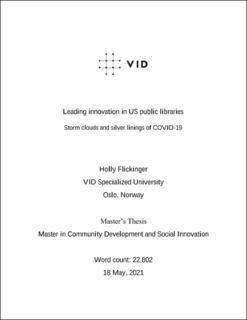Leading innovation in US public libraries. Storm clouds and silver linings of COVID-19
Abstract
This thesis examines how US public libraries are innovating to connect with their communities during the COVID-19 pandemic. The work pays special attention to the role of leadership in the innovation process. By examining two cases of US library systems, I trace crisis-driven innovation processes, uncover incremental and radical innovations, and aim to understand the role of leadership and multi-actor collaboration. This thesis studies the time period between March 2020, when COVID-19 emerged in the US, and January, 2021, when the pandemic was still very active in the US. I use two case studies based on semi-structured interviews, various documents, social media and websites. Through an institutionalist lens, this thesis finds that the majority of pandemic-born crisis-driven innovations are in the prototyping stage. However, some have reached the stage of ‘scaling and diffusion’, meaning they have brought significant performance improvement and can be replicated. Moreover, evidence suggests that during these processes, leaders act as conveners, facilitators and catalysts, and leverage multi-actor collaborations. The challenges faced by libraries and their leaders cannot be understated, the greatest being the effects of how the digital divide prevents a widening demographic of community members from accessing library knowledge and resources.
